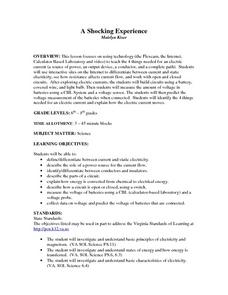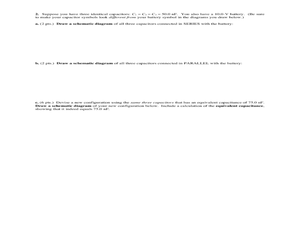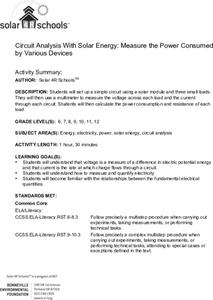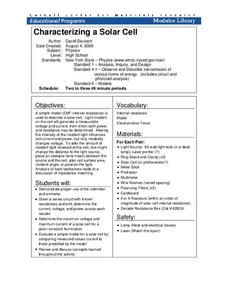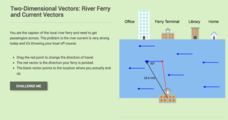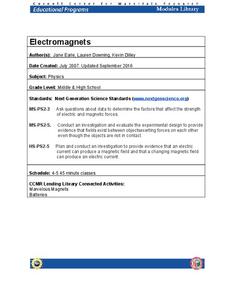Centers for Ocean Sciences
Ocean and Great Lakes Literacy: Principle 1
Is your current lesson plan for salt and freshwater literacy leaving you high and dry? If so, dive into part one of a seven-part series that explores the physical features of Earth's salt and freshwater sources. Junior hydrologists...
PHET
Ohm's Law
Why did Mr. Ohm marry Mrs. Ohm? He couldn't resistor. An electrifying simulation allows scholars to control both voltage and resistance in order to see the current change. The formula is displayed and as you increase one variable, it...
Institute of Electrical and Electronics Engineers
Get Connected with Ohm's Law
Ideal for your electricity unit, especially with middle schoolers, this lesson plan gets engineers using multimeters in electrical circuits to explore the relationships among voltage, current, and resistance. Older learners may even plot...
Curated OER
Typical Conceptual Questions for Physics I - Waves, Electricity, and Magnetism
This wave and electromagnetism assignment is so thorough, it could be used as a unit exam. The first section of it covers wave concepts. The next section addresses static electricity. There is a section that deals with electric circuits....
Curated OER
A Shocking Experience
Learners differentiate between current and static electricity, conductors and insulators, explain how energy is converted from chemical to electrical, measure voltage of batteries, collect data on voltage, and predict voltage of...
Curated OER
Worksheet 19: Ship Positions
In this math worksheet, young scholars read informational paragraphs and then answer 18 questions using data from their readings. Questions are about vectors, positions, distance and orbits.
Curated OER
Solar Kit Lesson # 12 - Calibration Curve for a Radiation Meter
Scientists need to have mastered algebraic slope-intercept concepts in order for this lesson to be effective. They will measure and graph solar panel output as a function of the amount of radiation striking it, discovering that there is...
Curated OER
Fall 2005 Midterm Exam #1
You've got the power! With this physics midterm, you have the power to assess learners' grasp of electricity concepts. The exam is neatly formatted and provides a variety of question types: true or false, multiple choice, and problem...
Curated OER
Fall 2003 Midterm Exam #1
Electricity is the focus of this college-level midterm exam. It requres physics learners to answer multiple choice and short answer questions in addition to evaluating several diagrams and graphs. This is appropriate for most high school...
Curated OER
Regents High School Examination - Physics 2010
Give every type of learner in your physics class an opportunity to demonstrate what they have learned throughout the year. From analyzing tables and graphs, to evaluating diagrams and solving problems, there is an outstanding variety of...
Curated OER
Physical Setting: Physics Exam 2004
Twelve pages of mostly multiple-choice questions comprise this comprehensive New York Regents physics exam. It covers an entire year's worth of physics curriculum and requires about three hours for completion. Review the questions to...
Curated OER
Fall 2004 Midterm Exam #2 - Electricity and Magnetism
Written for a college physics course, this midterm examination deals with electric and magnetic fields. When taking this test, learners answer multiple choice questions, solve problems, and analyze a variety of attractive diagrams....
Curated OER
Midterm Exam #1, Electricity Concepts
The physics department at The University of Hawaii has designed midterm exams for their college physics courses. This version deals with electricity concepts. It requires learners to calculate conversions, capacitance, and potential...
Curated OER
Coulomb's Law and Induced Polarization
Engage your aspiring physicists in a series of lab activities directied at demonstrating the behavior of electric force. In completing these exercises, learners will explore Coulomb's and Gauss's Laws. Well-written directions to four...
Bonneville
Macro-Scale Solar
There's no substitute for the power of the sun. The second of four installments of the Solar Resources Assessment unit looks at macro-scale photovoltaic (PV) technology. Future scientists first learn about PV modules with a PowerPoint...
Bonneville
Circuit Analysis With Solar Energy: Measure the Power Consumed by Various Devices
Power up the class with a instructional activity on electronics. Scholars use a solar module to create an electric circuit. They connect different devices to the circuit and measure the voltage and current. Based on the measurements,...
Purdue University
Design of a Door Alarm
How does electricity work? Budding scientists explore the concepts of electrical currents and open and closed circuits with class discussion and a hands-on activity using a battery to turn on a light bulb. Learners also make predictions...
Mascil Project
Design and Build Your Own Vacuum Cleaner, Hair Dryer or Toy Car
No vacuum cleaner? No problem, just build your own. Scholars apply knowledge of currents to build a model of either a vacuum clear, a hair dryer, or a toy car. While the class completes the activity, instructors consider gender...
Physics Classroom
Ohm's Law: Voltage-Current-Resistance Relationship
Join the resistance—Ohm! Scholars apply Ohm's Law to problems of increasing difficulty as part of a series on electric circuits. The lesson begins with simply doubling and tripling voltage or resistance. It ends with having pupils solve...
Cornell University
Characterizing a Solar Cell
Young classes are sure to get a charge out of this lesson! Learners experiment with circuits of a solar cell. They practice determining current, voltage, and power for the circuit and maximize the voltage and current of the cell.
CK-12 Foundation
Two-Dimensional Vectors: River Ferry and Current Vectors
Fight against the current. Pupils explore the resulting path when they are crossing a river while being pushed downstream by the current. Using vector notation, learners express the speed and direction of a ferry. They finish by...
Cornell University
Electromagnets
Discover the connection between electric current and magnets. Scholars create electromagnets by passing a magnet through a coil. They experiment with different materials to determine the variables that affect the strength of the current.
CK-12 Foundation
Power Lines
How does electricity travel through power lines? The simulation demonstrates the how changes in voltage and resistance are related to the distance between power polls and the thickness of the cable. Scholars control three variables in...
University of Colorado
Terra Bagga
Earth's magnetic poles switch positions about every 200,000—300,000 years. In the activity, groups create a planet with a magnetic field. Once made, they use a magnetometer to determine the orientation of the planet's magnetic field....






